O, readers, how full the first quarter of this year has already been with new seasons and new series on good old TV! Let’s waste no time in diving into them now.
On tap for you this serving we have (among others): three period costume dramas and one animated soufflé. Enjoy!
Shōgun (Series Premiere)
Hulu • Drama • “Who are enemies? Who are our friends?”
Synopsis
An English sailor plays politics against Dutch and Catholic interests in politically unstable 17th-century Japan.
My take
In his (1975) review of James Clavell’s (1975) original novel, The New York Times’ book critic Webster Schott praised the author for his “gift” in making the narrative “not only something that you read” but moreover something that you live. Mass market readers of the time evidently felt the same way, quickly compelling the novel into 52 printings within its first five years of publication and cumulatively purchasing more than 15 million copies worldwide by 1990. In the nearly 34 years since, the momentum that publication thoroughly enjoyed has hardly cooled; it’s really only transmuted: Adapted into a two video games, two miniseries, and even one Broadway musical, it’s abundantly clear, Shōgun proliferates, repeatedly attracting attention.
In its latest instantiation, a limited series on Hulu via FX, Shōgun appears to lose none of its original compelling magnetism. A high costume drama, rife with courtly intrigue, the new series receives high marks in my book and many others’ for both its engaging visuals and its active storytelling. Decadent and historically faithful costumes and sets create a lively and attractive environment it’s easy to see its resident characters argue to preserve or to possess; and within that environment dialogue stacks interpersonal messages in layers sometimes four deep beneath international politics, intracultural decorum, and interpersonal responsibility — a feat that not only resists all modern temptation in television writing to lean on the easiest notations and dot the beats of the plot like lyrics on a karaoke screen for an audience, but moreover here doesn’t even break a metaphorical sweat while maintaining the legibility of a conversation about four things at once. That this feat happens to take place credibly within the long-gone historical context of nascent commerce between three geographically remote cultures is downright exceptional; and, whether I should thank the source material from Clavell himself or the adaptation by married writers Rachel Kondo and Oscar nominee Justin Marks, I almost don’t care. I’m just glad that it’s found its way onto my screen, with special thanks to lead actor Hiroyuki Sanada, whose performance owns the center stage.
Temperature check
Hot.
Delicious in Dungeon (Series Premiere)
Netflix • Animation • Snackability
Synopsis
Dungeon adventurers learn to “live off the land” while on a mission to rescue their fallen friend.
My take
Readers who especially loved Tatamitani (dir.) and Momose’s (wri.) genius (2022) Thermae Romae Novae after I wrote about it two years ago may now also delight in this spiritual cousin, whose similarly clever blend of animated adventure and lifestyle television also hits an exciting-yet-cozy central note. Here resonant with:
recent animated classics like:
Steven Universe (e.g., “Cookie Cat”; Sugar [creator], 2013-2019) and
Adventure Time (e.g., “bacon pancakes”; Ward [creator], 2010-2018) as much as with
some less obvious cultural relatives in home cuisine like:
The French Chef (Child [creator], 1963-1973),
that central note is the dinner bell for anyone interested in savoring new and inventive animated storytelling.
While the mythical ingredients on the menu are hardly likely to have stocked Julia Child’s actual pantry, the dynamic and endearing presentation of culinary know-how (however fantastical) alongside the adventuring, intrigue, and battles has quickly made this series a current favorite to stream over my own freshly prepared meals. Far more successful than Amazon Prime’s relatively weak attempt at an animated adventure series (i.e., The Legend of Vox Machina; Auman [creator], 2022-present), Delicious in Dungeon succeeds precisely because it seasons its own resilient call to adventure with the restorative spirit any such call would really need to be heard.
Temperature check
HOT! (and YUM!)
Palm Royale (Series Premiere)
Apple TV+ • Comedy • Vanity Fair
Synopsis
A spirited newcomer tries to pull the strings of a stuffy Floridian society to her own advantage in 1969.
My take
My mother always said, "Live on Fisher Island; get buried in Palm Beach. That way, you'll have the best of Florida."
Kristen Wiig leads the cast of this perhaps predictably quirky, yet heavenly styled Apple TV+ comedy/drama about a social climber with a scheme; and it’s almost refreshing to see her abandon pulling faces to try to embody a more three-dimensional character — almost. Wiig, though not without a perfectly period charm in this lead role, just can’t resist relying on, or at least routinely resurfacing, her comedic instincts to carry her through especially the otherwise emptier moments in this perhaps unintentionally perky series. While that perk, intended or not, does mean lightness and flavor in the same way Jane the Virgin (Snyder Urman [dev.], 2014-2019) — perhaps the series’ nearest cultural relative — found soapy insouciance around every corner, there is a complementary gravity I find myself wanting in Palm Royale, an earnest heart akin to the at-home family values Jane and her mother and grandmother counted on in their series, to make me endeared more to the central character’s story and plight than I now feel after five hour-long episodes of viewing. Supporting actresses, Oscar winners, and Rich Picks Alison Janney and Laura Dern do their best to counterpoint Wiig’s levity, the three establishing a core triangle of relationships that tells the series’ nearly allegorical central thesis on wealth, aspiration, and happiness; but perhaps not even they, with all their mettle and experience, can really hold onto this slippery soap with much tenacity. At least firmly planted is the series’ visual delight in Emmy winner Alix Friedberg’s stunning costumes and Emmy nominees Jon Carlos and Ellen Reede’s colorful sets — together, frankly, almost as impressive a sight as how defiantly ageless 52(!)-year-old Ricky Martin looks standing among them. (Tip your make-up and lighting teams, people.)
Temperature check
Tepid (though, for a lark, why not?)
Feud: Capote vs. the Swans (Season 2)
Hulu • Drama • Rebuke
Synopsis
The flames of an incendiary impliqué burn the bridge of close personal friendship each of a bevy of New York socialites previously held with lush raconteur Truman Capote.
My take
Naomi Watts wants an Emmy — and why shouldn’t she? The two-time Oscar-nominated actress was a noteworthy cast — perhaps the noteworthy cast — in this long-awaited second season of Ryan Murphy’s most infamous anthology series, Feud, an intentionally difficult redecoration of the lives and crackling conflicts of cultural idols in their heydays of yore. No doubt, casting Watts in the lead role here helped attract the great rest of talent this new season enjoys into its ensemble: from Manhattanite curiosity and fashion icon Chloë Sevigny to Broadway baby and Tuscan enchantress Diane Lane — the two also, coïncidentally, Oscar nominees. Perhaps even acclaimed and Oscar-nominated director Gus van Sant, best known for his long-form portraits of socially fringe young men (e.g., My Own Private Idaho [1991], Good Will Hunting ]1997], Last Days [2005], Milk [2008]), was similarly drawn in, to helm the project across all but two of its eight episodes.
And so Watts should earn that Emmy, or at the very least a nomination — no, not because of her evident star-power or its ability to attract other stars to the cast and crew on this series, but rather because of the honest-to-goodness terra firma acting — yes, “acting” in bold — she brings to this otherwise largely flimsy attempt at reïntroducing Feud to the public. Yes, readers, despite her and Tom Hollander’s impressive performances, Ryan Murphy’s second installment of his once quite thrilling Feud is now a largely uncomfortable but passably entertaining shell of a drama about interpersonal conflict that once made the headlines.
That said, I must insist, readers: Capote vs. the Swans is not (also, in bold) an out-and-out failure. Unlike several notable reviewers would have you believe (e.g., The New Yorker, The New York Times), the new season is not the entirely lifeless mess of cursory disappointment any fleeting viewership could claim it to be. Yes, the writing has apparently fallen on hard times: Despite an evident love of midcentury icons — especially those whose memories are too faint in our current culture — Feud fails its new bid to resurrect and then capitalize on the tabloid heartaches that those icons’ contemporary audiences once enjoyed over Sunday mimosas or evening cordials, mostly because unlike its first season this second (for reasons unclear to me) chose not to fill the gaps between the public milestones, marking the intersecting lives of its many characters in our common cultural memory, with any drama that goes beyond the superficial tension of those same magazine-cover battles and blind-item disagreements in either content or intention. Still, ultimately, the writing does save itself and this season by remembering that what audiences really want from Feud is more than a mere celebrity scandal; it’s to see our own quintessentially human dramas play out on the dazzling stage of the rich and famous, whose far removal from our own everyday lives allows us to safely watch and contemplate their otherwise threatening interpersonal patterns of behavior as rehearsals for hardships we all could come to face ourselves one day (and to upend the power dynamic implicit in ‘celebrity’ through unfiltered spectatorship to boot).
While, of course, the plot and tenor of this new season clearly defy the expectations of their umbrella title and its preceding season — i.e., this season is less like an active feud than a passive fizzle — setting aside those expectations prior to viewing can allow audiences to identify and enjoy what this season actually is: a plea to place humility in front of grace. In the company then of van Sant’s more dressed-down projects — e.g., Last Days, Finding Forrester (van Sant [dir.] & Rich [wri.], 2000), Promised Land (van Sant [dir.], Damon, & Krasinksi [wri.], 2012) — Capote vs. the Swans rests quietly in the hands of Watts, Hollander, and the ensemble and never tries to be anything louder or more ardently dramatic. The point of the season is not to wail in the stylishly petty battles between their central characters (or their allies), but instead to examine the roots and the residue of their strident break from each other as elements of a decay and a self-sabotage that outstrip the only actually human connections for miles in a sea of solely transactional partnerships. It is a cautionary tale, a fable almost, albeit set on the mid-century Upper West Side. It urges us to recognize the limitations of our individuality, however hard won we cherish that individuality to be, and to embrace the emotional dependencies of interpersonal vulnerability, however painful they may turn out to be, lest we neglect our own legacies in the process.
So, yes, anyone who comes to this second season of Feud with the thirst for mid-century barbs á la the disputes on any franchise of Bravo’s The Real Housewives (Dunlop [creator], 2006-present) won’t really be able to enjoy any such vituperative combat, because it’s simply not there; but will hopefully leave instead with a more somber appreciation of the lessons from this didactic autopsy of the recent past (and with a greater admiration of Naomi Watts’ career).
Temperature check
Tepid
True Detective: Night Country (Season 4)
Max • True Crime • Pardon the Ice
Synopsis
A small-town Alaskan police chief begins to question her own internal compass when her community’s social stability falters following a string of suspicious deaths.
My take
Oure lige lordes seel on my patente,
That shewe I first, my body to warente,
That no man be so boold, ne preest ne clerk,
Me to destourbe of Cristes hooly werk.
Florian Hoffmeister’s delicate cinematography elevates our renewed interest in this particular brand of pseudo-true crime drama at Max. Having gone off the series after its touchstone début season, I — like many of you, I suspect — haven’t bothered to tune into any new installment of True Detective since 2014. In the intervening ten years, the caliber of the the two seasons otherwise on offer just didn’t seem to pass muster enough, no matter how initially interesting the idea of Mahershala Ali in the leading role may have appeared. Perhaps we missed out, but at least critical consensus (Rolling Stone, The New York Times) wants to reässure us that we did not.
So, why then the return at all? For a series that seems to have for two entire seasons phoned in the modicum of American noir drama necessary for it to exist as a modern true crime series, is there even hope of anything further and more engaging in yet another season?
The short answers, readers, are Jodie Foster and a little. True Detective: Night Country manages to revitalize an almost dead true crime franchise with a geographically and politically distant take on the now evident formula behind the show: Women in law enforcement at the edge of civilization and the wild frosty beyond contemplate past crimes in light of new ones on both personal and professional levels, in a modern Pardoner’s tale (see Chaucer, ca. 1390) on the road to absolution. And, just as in Chaucer’s original tale, that absolution comes at the cost of the storyteller’s gain. Foster’s Chief Danvers — spoiler alert — willingly accepts the blood toll of her cumulative actions as the price of her particular pardoning business in the dreary Alaskan landscape, and the moral tale concludes. All that remains in the season is a nearly direct rip on a substantial part of the plot of Unknown World’s (2019) frosty survival game Subnautica: Below Zero. Weave those two separate threads together, and you’ve reïnvented a show.
Cynicisms aside, of all the work this season the blue ribbon goes unequivocally to Fiona Shaw. Perhaps best known among the millennial set as the vile Petunia Dursley in the cinematic adaptations of Rowling’s [1997-2007] Harry Potter series, Shaw plays the hardened but scholarly Rose Aguineau, a solitary survivor on the lonesome edge of town (whose characterization definitely feels lifted from Below Zero’s Marguerit Maida). Implacable and wise, Shaw’s Rose is the one character I found myself actually compelled to root for and embrace during the season’s run and should earn her the Emmy for Supporting Actress in a Limited or Anthology Series or Movie later this year.
Temperature check
Tepid
Masters of the AirMasters of the Air (Season 1)
Apple TV+ • War • Air Force Fun?
Synopsis
American and British fighters fly into personal, bureaucratic, martial, and literal headwinds during their fateful missions into Nazi Germany during World War II.
My take
Readers, have you seen The Notebook (Cassavetes [dir.] & Leven [wri.], 2004)? Or — better yet — does anyone know why Americans love to romanticize going to war? Is it really that the commercial mix of attractive young (white) people and events that happened eighty years ago hits the right demographic boxes of interest from boomers and still lingering members of the silent generation on one hand to zoomers and millennials on the other, that it makes any sense for us to greenlight yet another entire series about the Allied military personnel of World War II? Or is it just that the psychological distance between then and now, when we had an enemy we universally decried as evil, permits the canonical “good vs. evil” story where other wars feel far less cut-and-dry to dramatize?
All of these questions flooded my mind the first five minutes of Apple TV+’s new Master of the Air, a series tracking the ups and downs — literal and figurative — of especially American bomber pilots active in Europe during the second World War. Actors Austin Butler and Barry Keoghan, fresh off their Oscar nominations last year (for Elvis [Luhrman et al., 2022] and The Banshees of Inisherin [McDonagh, 2022], respectively), feature as two of the several active officers whose stories we’re asked to care about — no, more than simply “care about": “identity with.” Yet, apart from Colleen Atwood’s (per usual) en pointe costume design1, this new series has little to soar about. It’s really just more of the same pulp softcore masculinity porn for men (and the women they dramatically rescue) we’ve seen now countless times before, a feel-good anesthesis for audiences looking for something blindly nationalistic, safe, and vaguely nostalgic to put on while they drift half between waking and sleeping. What more this series has to contribute to a legacy firmly established by previous works including:
Wings (Wellman [dir.], Loring, & Lighton [wri.], 1927),
Band of Brothers (Hanks & Spielberg [creators], 2001),
Dunkirk (Nolan, 2017),
Iron Eagle (Furie [dir./wri.] & Elders [wri.], 1986),
Top Gun: Maverick (Kosinski et al., 2022), and
Devotion (Dillard [dir.], Crane, & Stewart [wri.], 2022)
is a mystery to me. I won’t ask you to find it.
Temperature check
Cold
Bottoms (2023)
Amazon Prime / MGM+ • Comedy • Self-determination
Synopsis
Two deeply uncool lesbian high school students stumble into running an intramural fight club in order to get closer to the women of their dreams.
My take
The bizarre thing about Bottoms is how much of its story and structure is actually rote school popularity drama about adolescent sexual pining. Recall:
Pitch Perfect (Moore [dir.] & Cannon [wri.], 2012),
Mean Girls (Waters [dir.] & Fey [wri.], 2004),
Election (Payne [dir./wri.] & Taylor [wri.], 1999), and
Weird Science (Hughes, 1985)
among many, many others. Formulaically, Bottoms is actually the most boring “new” entry into this subgenre I’ve seen in quite some time; utterly predictable in its plot points from start to finish, there isn’t a single narrative ‘surprise’ the film ever got away with throwing at me.
That said, filmmakers Emma Seligman and Rachel Sennott clearly intended on using this utterly predictable narrative as scaffolding for capricious and seemingly often improvised embellishments that lend the film literally all of its character. Upending stylistic expectations left and right with specifically an absurdist’s lens on the perfunctory milestones (large and small) the narrative must hit (e.g., a “supportive” teacher, a peer’s hypersexualized mother, the showboating athlete, the central scheme to become popular), Bottoms supplies ironic and self-reflexive comedy in large doses, thanks in large part to the carefully apologetic performances of its leading characters, from recent Emmy and SAG Award winner Ayo Edibiri and her co-star, film co-writer Rachel Sennott.
If anything spoils this unique chaotic charm (which situates Bottoms closest in its subgenre to Booksmart; Wilde et al., 2019), it’s only how much the film obviously enjoys telling you it knows how clever and humorous it’s being: Punctuating nearly every punchline with silent beats that are the acoustical equivalents of fourth-wall-breaking looks askance toward the camera (think The Office; Daniels [dev.], 2005-2013), the film overall loses external credit and internal credibility by seeming to trust the audience so little that it thinks it needs to bend beyond rhythmic diegetic plausibility to guarantee every joke lands.
That said, you will laugh, readers, I’m pretty sure.
Temperature check
Tepid (barely; a strong brew of very weak tea)
The Regime (Series Premiere)
Max • Satire • A Stagecoach with No Driver
Synopsis
Superstition, position, and persuasion jockey dominance around the chancellory of a small, Western European nation with a dissident past.
My take
Despite what seems like an ocean of time away from the big screen2, Kate Winslet reminds us all that she is and has always been a force to be reckoned with. Magisterial and comic, whipping back and forth between dependency and dominance, and styled to diplomatic perfection, Winslet dazzles in the lead role as Chancellor of a small but fervent (fictional) Western European state in this highly original political satire, which finds its closest cultural relative in Iannucci’s political black comedy (2017) The Death of Stalin. Six-time Emmy-winning television writer Will Tracy brings his experience on both Last Week Tonight with John Oliver (Oliver [creator], 2014-present) and Succession (Armstrong [creator], 2018-2023) into hybrid fruition here, gracefully mixing the biting sociopolitical commentary Oliver channels with panache every week with the ostensibly decorous hierarchical in-fighting the Roy family members (and their hangers-on) exchanged in lieu of handshakes; and in directors Stephen Frears and Jessica Hobbs, Emmy winners in their own rights, who are themselves best known for their own superb handlings of disputes among political intimates (see Dangerous Liaisons [1988] and The Queen [2006] for Frears and The Crown [2019-2020] for Hobbs), Tracy finds more than capable storytelling partners for this particular miniseries. Together, buoyed by Winslet’s performance and the performances of especially two supporting cast members, the trio delivers what looks easily to be the finest miniseries of the year. Only those viewers who tune into The Regime in the hope of seeing political commentary strongly referential to our actual international sociopolitical circumstances are likely to be disappointed.
Temperature check
Hot
Jerrod Carmichael Reality Show (Series Premiere)
Max • Documentary • Take Me Serially
Synopsis
Narrative comedian Jerrod Carmichael believes that making the public a co-owner of his choices will expurgate him of their consequent realities.
My take
Two years after his now Emmy-winning introspective comedy special Rothaniel (see my original take on that special here), comedian Jerrod Carmichael, ever accompanied by friend and producer-director Bo Burnham (however disguised), spills another pint of his own blood for the camera, so to speak, in this latest now serial documentary on his life. Taking himself through the paces of especially conflicts and come-uppances in love and sex, Carmichael stands out again as mention-worthy at least because of his intrepid willingness to simply put himself fully on display. That Burnham’s contrapuntal inclusion as the masked man establishes a Hegelian dialectic between the spectator and the spectacle on the masturbatory idolatry of self-documentary vs. the earnest intent to forego all pretentions not just despite but because of the public eye is the philosophical comic’s riposte to the obvious criticism, “Why should we care?”, otherwise readily levied onto any such self-centered and otherwise sophomoric media and raises the stakes of the series far above what I initially expected or even considered possible. If the creative pair can steady the hand framing this ambivalent cinema verité enough to unfurl the tight knots woven around this extremely interesting philosophical dilemma without stumbling into the esoteric miasma of abstraction away from the real life Carmichael is evidently living in its focus, the series could be the farthest step forward for everyday documentary, or reality TV, we’ve seen since Bravo redefined the genre in the mid aughts.
Temperature check
Hot?
The jackets are unfairly good.
Yes, this is an unfortunate but playful reference to her last role in a major motion picture event, Avatar: The Way of Water (Cameron [dir./wri.], Jaffa, & Silver [wri.], 2022); and due to its delayed U.S. distribution I still have yet to see her (2023) performance as World War II photographer Lee Miller.

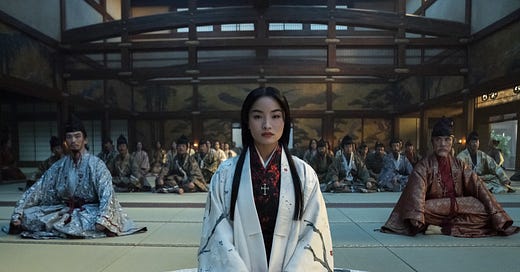



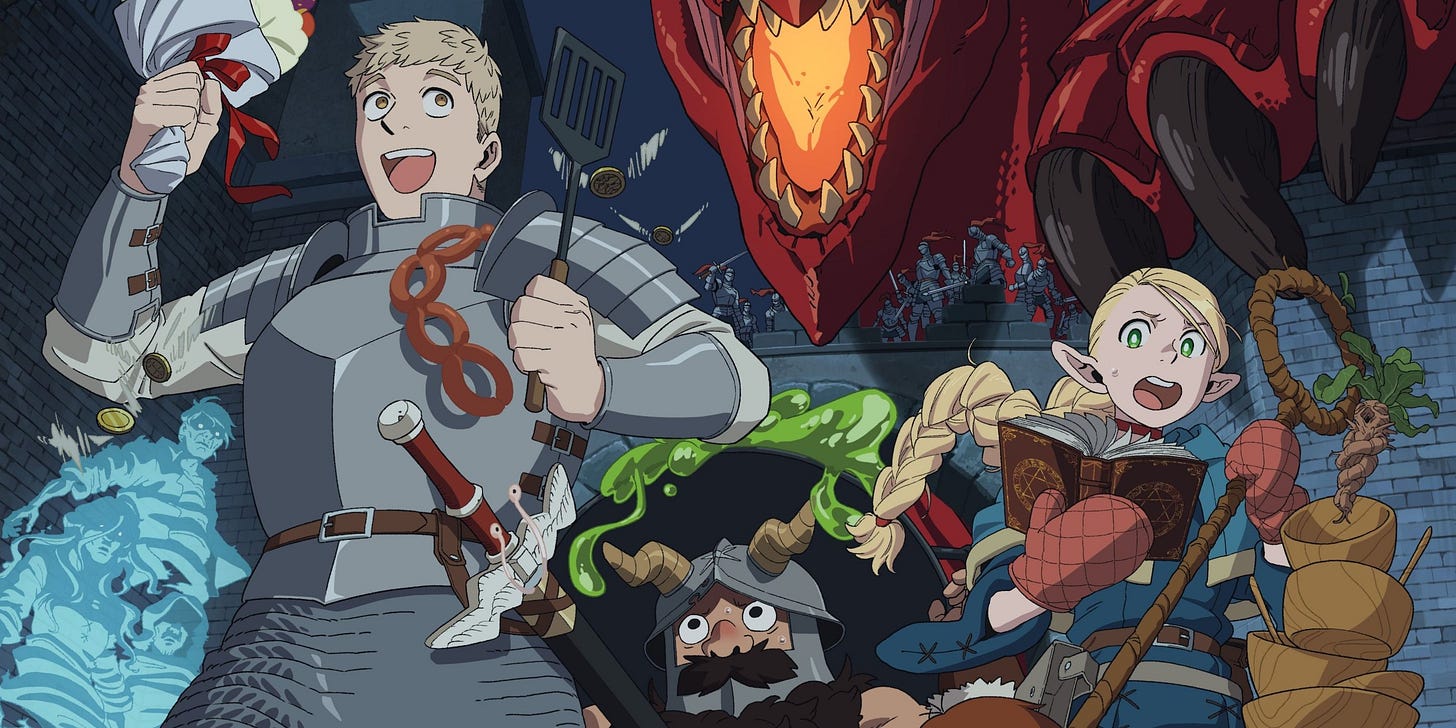
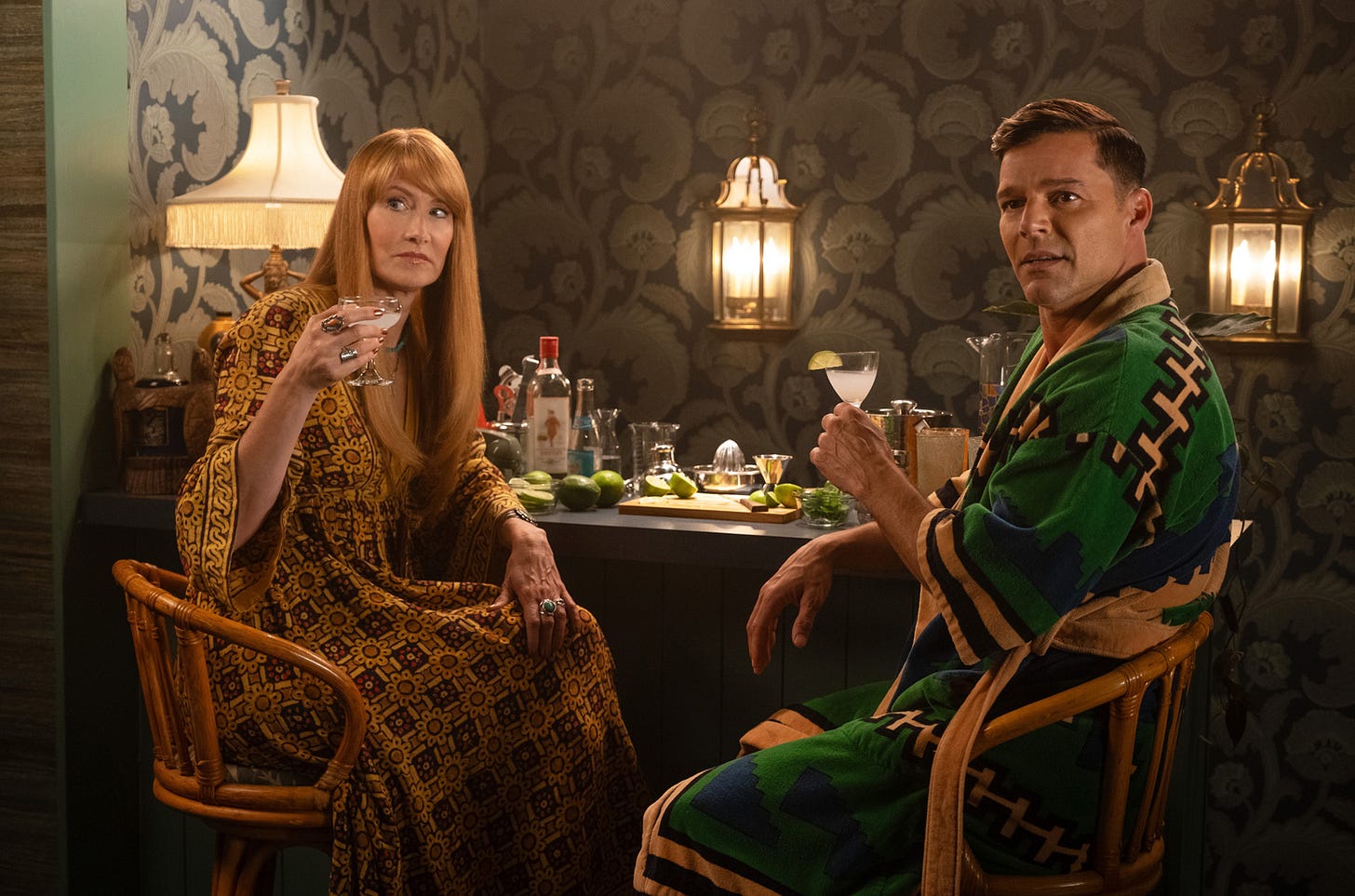

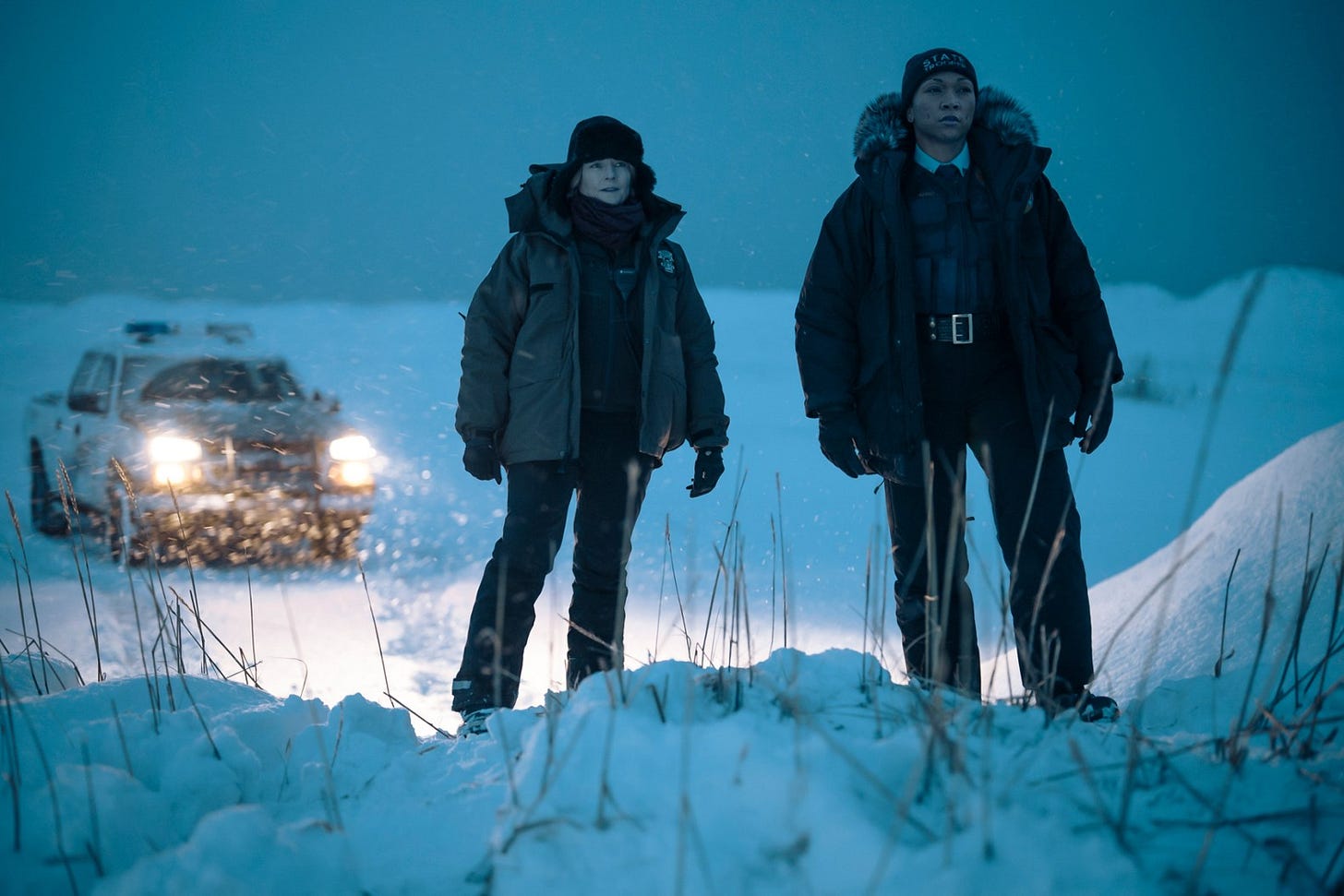
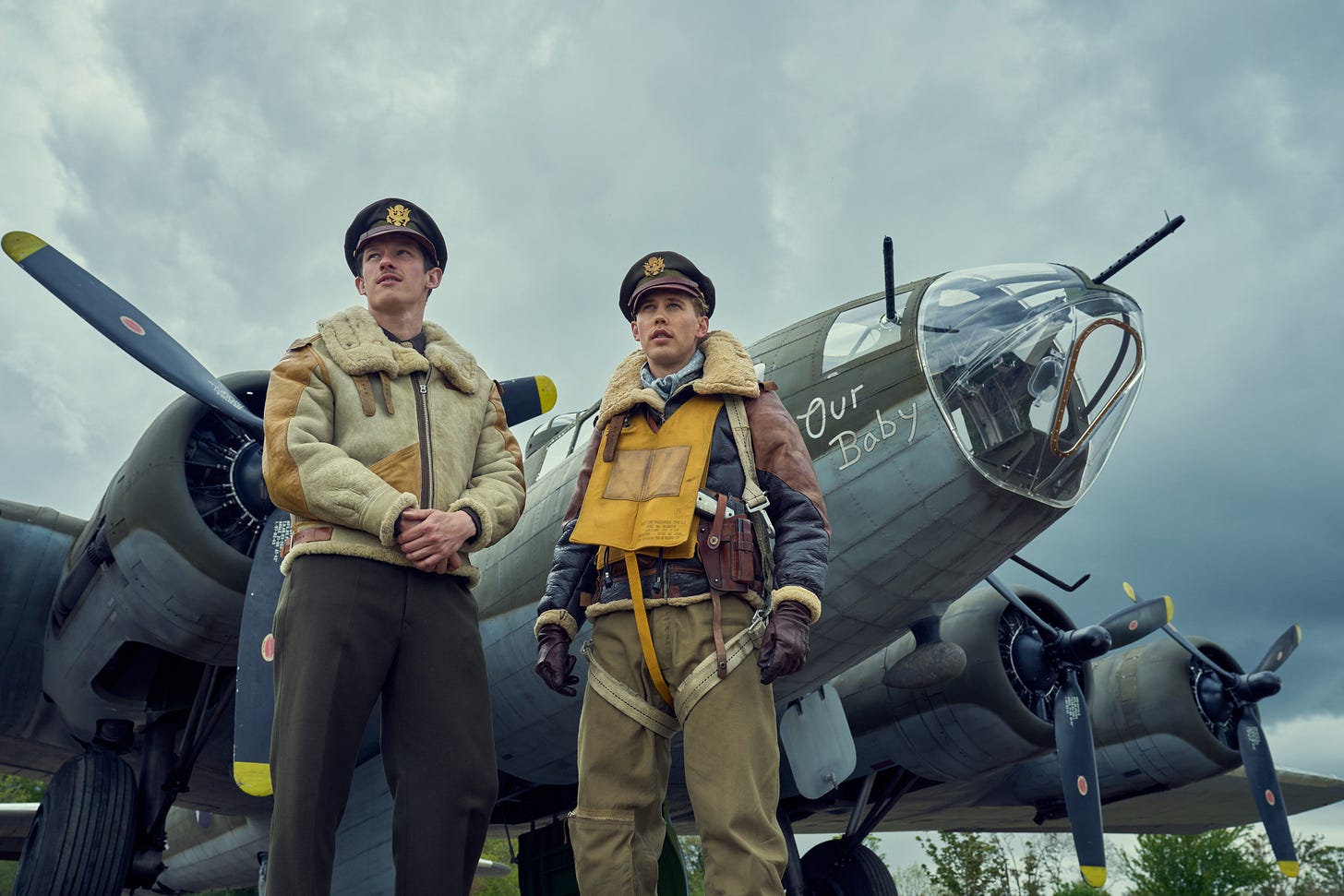
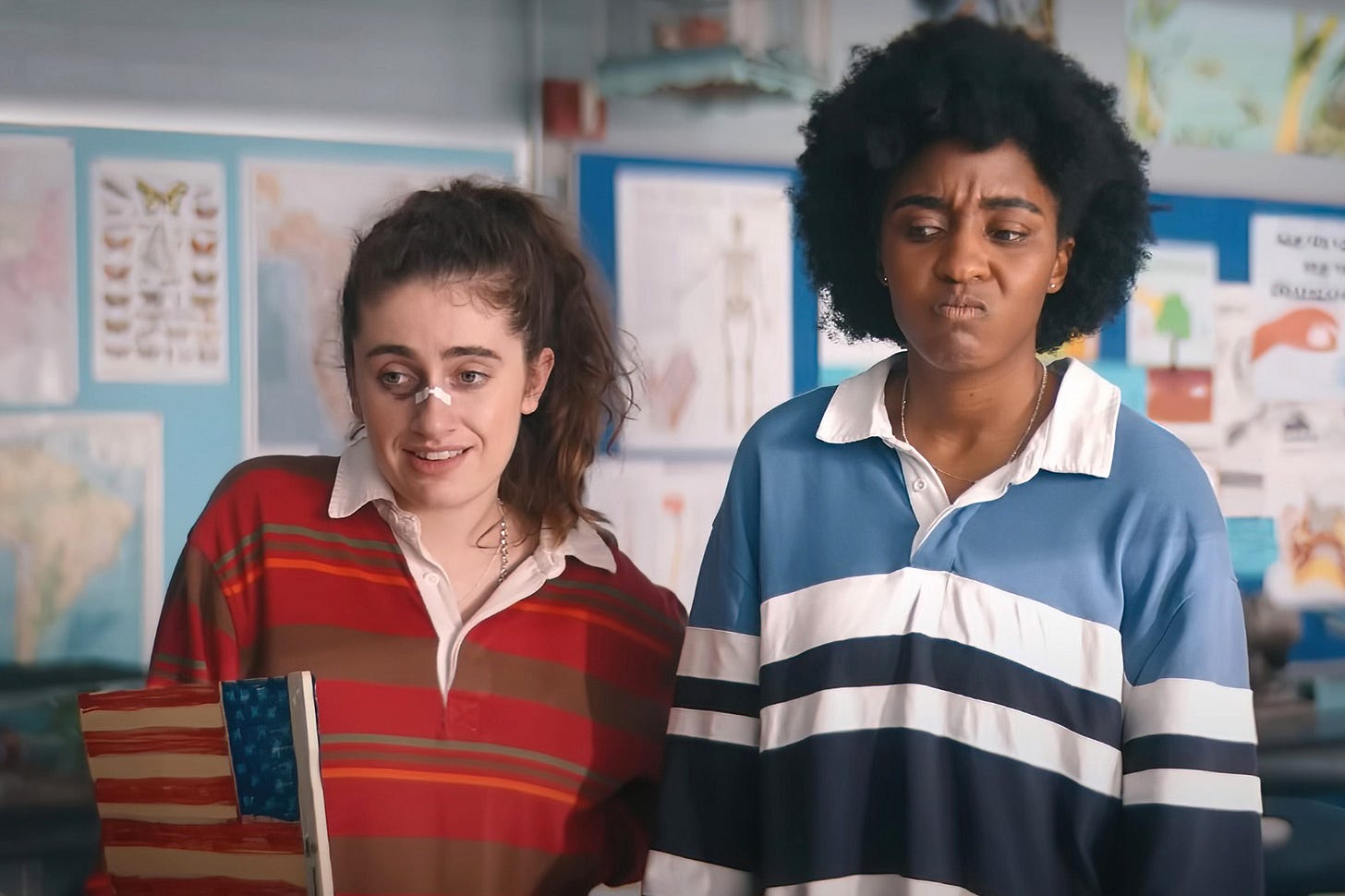
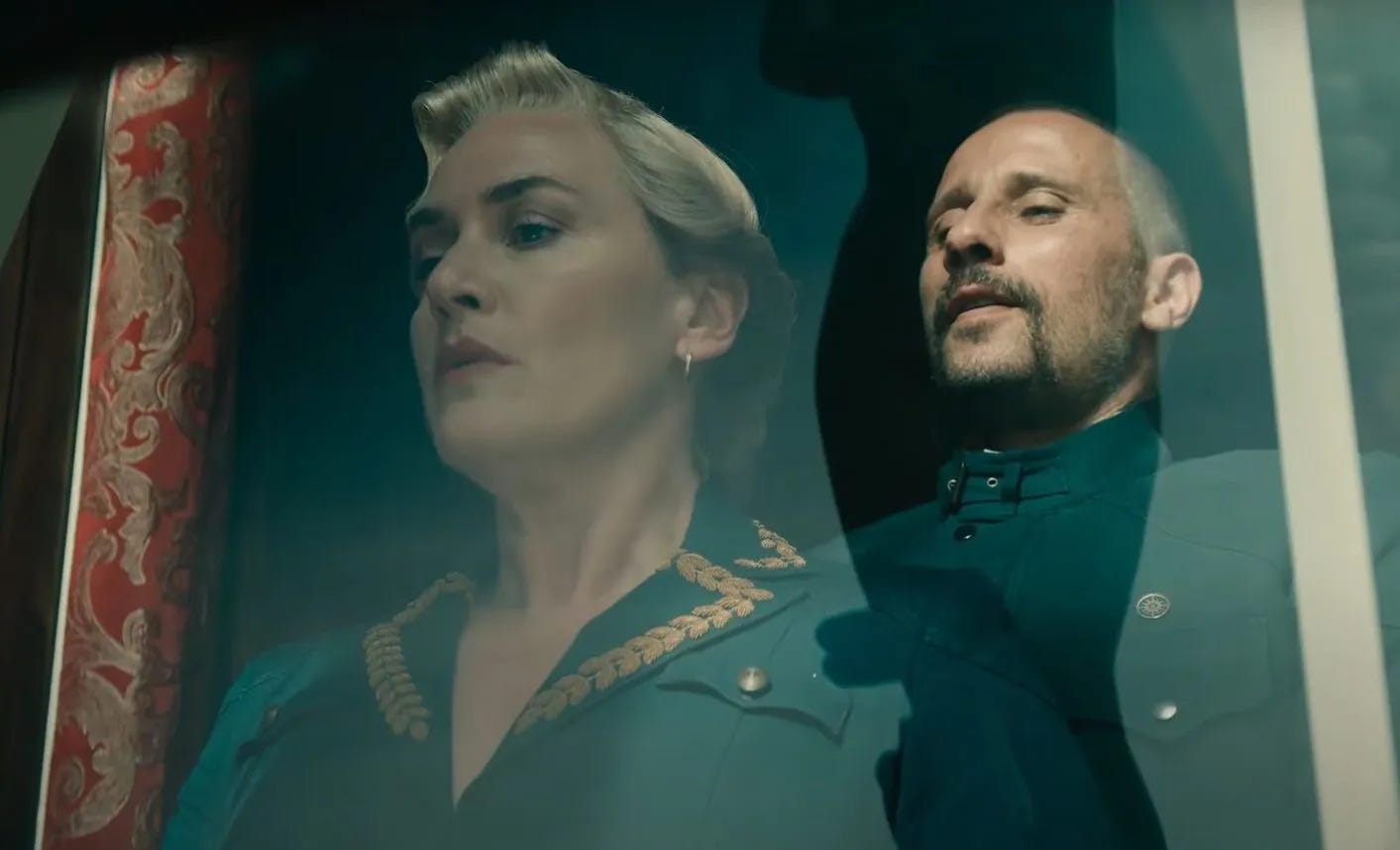
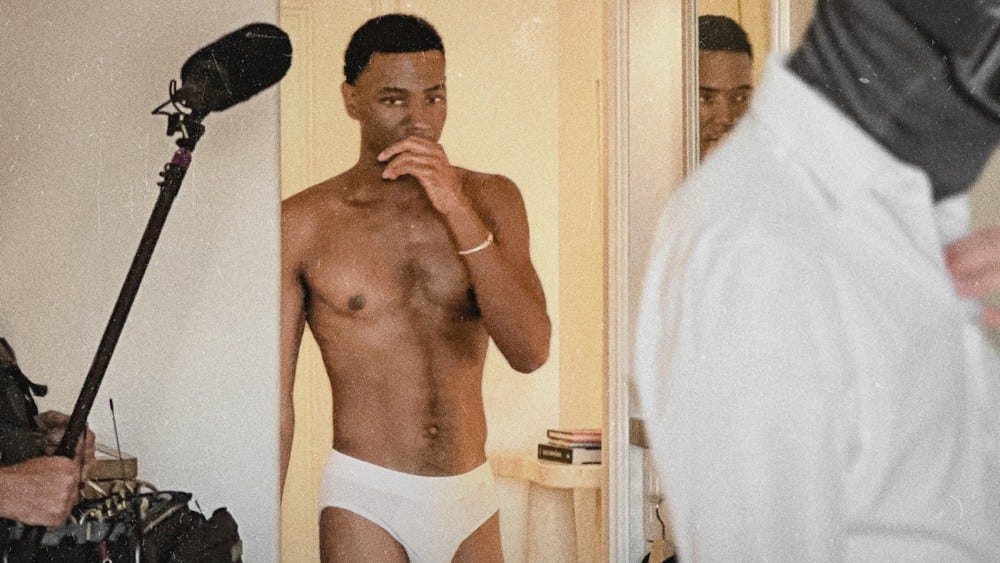
Delicious in Dungeon wasn’t even on my radar. Also I love that you can cite the plot of major video games the way you cite films, tv, and writing. Are the NYT reviews AWARE that the plot was lifted from Subnautica??? No!? That’s why you need Hot Tea.